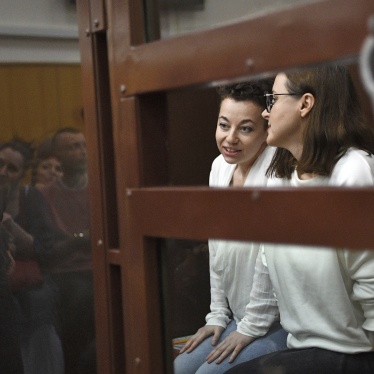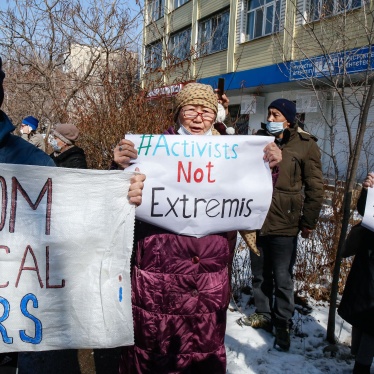The Italian government should halt its efforts to deport a national security suspect back to Tunisia, where he faces the risk of torture and abuse despite the Tunisian government’s unreliable promises of humane treatment, Human Rights Watch said today in a letter to the Italian government.
Nassim Saadi, a Tunisian resident of Italy, was acquitted of terrorism charges in Italy in May 2005. But the Italian Minister of Interior Giuliano Amato ordered his fast-track deportation in August 2006 under a special procedure for terrorism cases that denies suspects the right to remain in Italy while their appeal against deportation is considered. The fast-track policy has been criticized by the UN Committee Against Torture for lacking “effective protection” against returns to torture.
“Assurances of humane treatment from Tunisia won’t protect Nassim Saadi from torture, and the Italian government knows it,” said Julia Hall, senior Europe and Central Asia researcher at Human Rights Watch. “Instead of sending people back to face ill-treatment, Rome should put pressure on Tunis to stop abusing prisoners.”
Saadi appealed to the European Court of Human Rights, claiming risk of torture if returned to Tunisia. In October 2006, the court requested that Italy suspend the deportation until it issues a final judgment in the case, expected before the end of the year. The Italian government argued before the court in July 2007 that Tunisian government promises to treat Saadi humanely reduced his risk of ill-treatment.
“Tunisia has a long record of torturing and ill-treating prisoners and it has breached assurances in the past,” said Hall. “Tunis’s assurances are empty promises, given and received in a vain attempt to justify an illegal deportation.”
A recent Human Rights Watch report, “Ill-Fated Homecomings: A Tunisian Case Study of Guantanamo Repatriations” documents how the Tunisian authorities mistreated two former Guantanamo Bay detainees repatriated in June, despite Tunisia’s pledge to the US government that they would be treated humanely. Currently incarcerated in a Tunisian prison, both men have told visitors that their treatment has been so poor they would rather be back in Guantanamo.
Actions taken by Romano Prodi’s government in the Saadi case appear to be a reversal of the previous government’s rejection of “diplomatic assurances” against torture. In statements made in December 2005 and March 2006, an Italian representative at the Council of Europe vocally and steadfastly opposed the use of “diplomatic assurances” against torture and ill-treatment. Italy also joined a group of countries at the Council of Europe that argued, in concert with a coalition of nongovernmental organizations (including Human Rights Watch), that “diplomatic assurances” against torture and ill-treatment do not reduce or eliminate the real risk of abuse.
“Sending people back to risk ill-treatment undermines fundamental European values,” said Hall. “Italy should not rely on promises of humane treatment from any government that routinely abuses national security suspects. Such assurances are nothing more than a fig leaf for abuse.”
Background
An Italian court ruled in May 2005 that Nassim Saadi was not guilty of association with international terrorism, but convicted him of criminal conspiracy and forgery. Saadi was also convicted, in his absence, by a military court in Tunisia that same month and sentenced to 20 years of imprisonment for membership in a terrorist organization operating abroad and for incitement to terrorism, reportedly based on his alleged conduct in Italy.
Saadi appealed, but the minister of interior ordered his deportation to Tunisia in August 2006 under the fast-track procedure created by Law 155 of July 31, 2005 (the so-called “Pisanu Decree”), which explicitly denies a national security suspect the right to remain in Italy while an appeal is pending. In May 2007, the UN Committee Against Torture expressed concern about “the immediate enforcement of these expulsion orders, without any judicial review” and stated that the procedure “lacks effective protection” against returns to risk of torture (refoulement).
In his case before the European Court of Human Rights, Saadi claims that he faces a real risk of torture or other ill-treatment and other human rights violations in Tunisia, and thus cannot lawfully be returned there. Presenting its case to the court in July, the Italian government argued that the absolute obligation not to send a person back to torture or ill-treatment, enshrined in the court’s jurisprudence, should be reconsidered to allow a national security exception to article 3 of the European Convention on Human Rights (the nonrefoulement obligation). Such an exception would permit the risk of ill-treatment to be balanced against the alleged threat posed by the person subject to removal.
The Saadi case is one of several cases pending before the European Court of Human Rights in which the United Kingdom and a small group of other European governments are seeking to change the human rights court’s case law on the absolute prohibition on sending a person to a place where he or she faces a real risk of ill-treatment in favor of a test that would balance the risk to the individual against the risk to national security.








